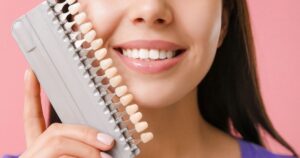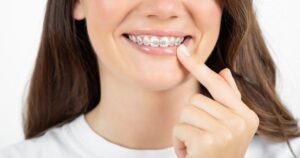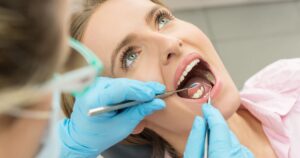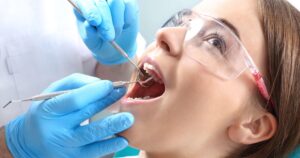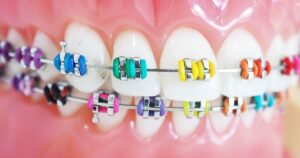Dry mouth, also called xerostomia, is a common side effect experienced by many children and teens who are undergoing orthodontic treatment with braces. When braces are placed, they may restrict the normal flow of saliva in the mouth.
The wires, brackets and bands that comprise braces can make it difficult to produce enough saliva to fully lubricate and moisturize the inside of the mouth. Without proper saliva, the mouth dries out more quickly. Food collects easily between braces as the saliva’s cleansing ability is reduced.
To combat dry mouth caused by braces, orthodontists may recommend Sugarless gum or candy that stimulates saliva production. Drinking plenty of water and limiting caffeine and alcohol intake also helps. Using biotene mouthwash or a saliva substitute spray provides temporary relief from the unpleasant sensation of a dry mouth during orthodontic treatment.
Key Takeaways
- Braces can obstruct the flow of saliva by trapping it between wires, brackets, and bands. This reduced saliva production leads to dry mouth.
- Without enough saliva, the mouth lacks the moisture and lubrication needed to swallow, digest, speak, and maintain oral health. Food is more likely to get stuck.
- Sugar-free gum and hard candies boost salivation. Xylitol-containing gum may help prevent cavities caused by a dry mouth environment.
- Drinking plenty of water and limiting dehydrating beverages/foods keeps moisture levels up. Carrying a water bottle helps stay hydrated. Don’t miss to read out this topic Braces Cost In India.
- Additional relief can come from special dry mouth rinses, sprays, moisturizers or oral lubricants containing ingredients like hyaluronic acid to coat tissues.
Overview Of Dry Mouth With Braces
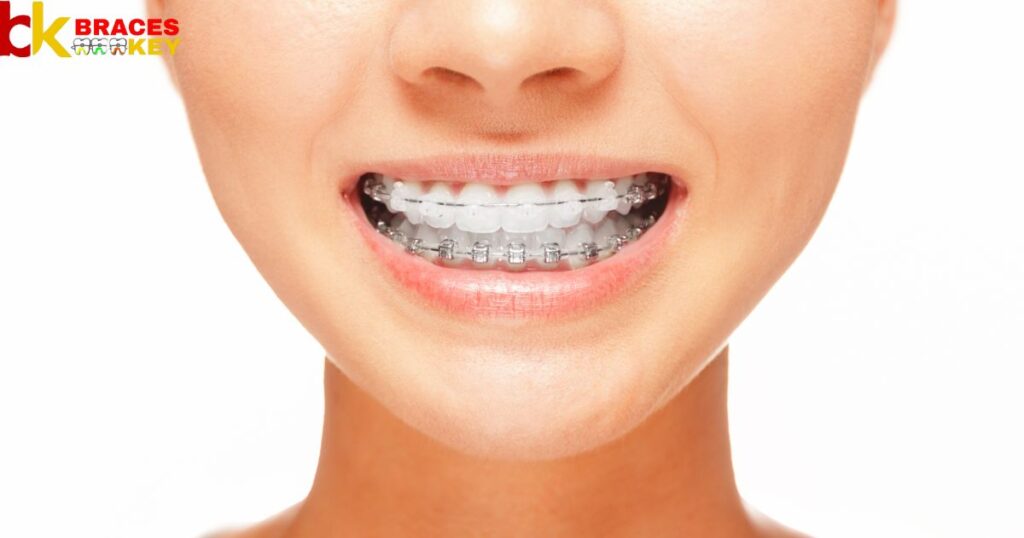
Braces can lead to a dry mouth as wires hinder natural saliva flow. Without saliva’s moist protection, the mouth easily feels parched. Food gets stuck where liquid once washed it away.
Relief comes through hydration and sugary saliva boosters. Patients also find respite in specialized rinses and remedies. Proper dry mouth management keeps braces treatment comfortable.
Step By Step Guide To Dry Mouth With Braces
- Carrying a water bottle to sip from regularly keeps fluids entering your mouth. Dehydration worsens dryness.
- Sugarless gum or hard candies stimulate saliva as you chew. Xylitol gum may also discourage cavity formation in a dry environment.
- Use a salivary substitute or oral lubricant gel before bed. This coats mouth tissues while you sleep to prevent waking with dryness sensations. Rinsing with a soothing mouthwash can also prep tissues for night.
What Is Xerostomia?
Xerostomia, more commonly called dry mouth, is a condition where the salivary glands don’t make enough saliva. This can cause difficulty eating, talking, and wearing dentures. For some, diabetes or medications are culprits that leave mouths parched.
Others suffer chronic dryness of unknown cause. To help prevent tooth decay and infections, it’s important for people with xerostomia to stay well-hydrated and use biotene oral balance gel. With simple steps, symptoms can stay well-managed.
What Causes Dry Mouth Syndrome?
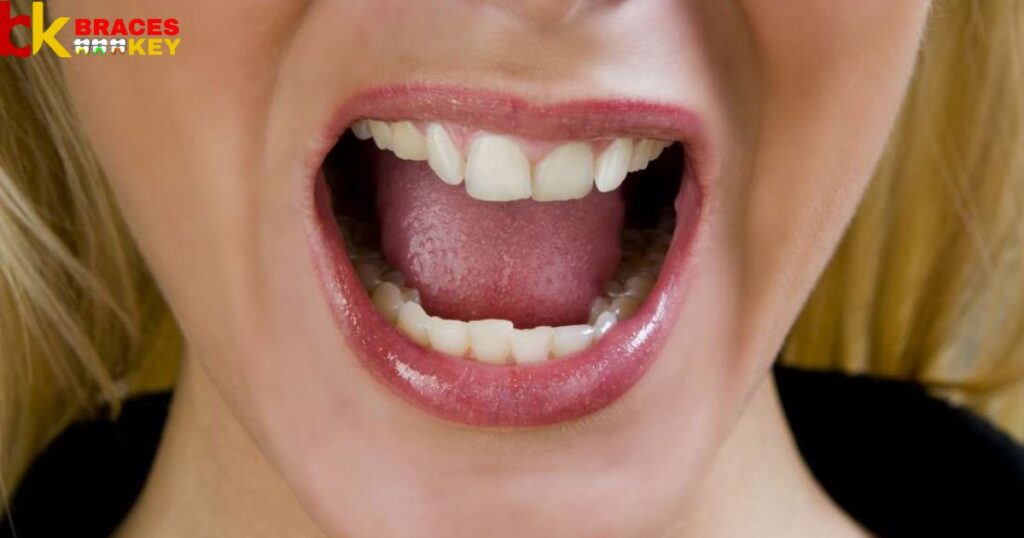
Dry mouth syndrome, known as xerostomia, can arise due to various issues that disrupt the salivary glands. For some, prescription pills to treat high blood pressure or depression are the root cause, while Sjögren’s syndrome brings autoimmune-related dryness.
After radiation treatment for head or neck cancers, saliva production may take a hit. Simply getting older or breathing through the mouth excessively can even lead to drier or thicker saliva. Pinpointing triggers aids management of this bothersome condition.
Do Braces Cause Dry Mouth?
Many wonder if orthodontic treatments like braces could induce dry mouth. While the hardware doesn’t directly trigger xerostomia, aligners attached to teeth may occasionally interfere with typical salivary flow.
When this happens, mouth wetting drops used during meals and snacks ease any temporary discomfort. Most importantly, regular dental visits allow orthodontists to check saliva levels and fix any brackets or wires cutting saliva production. With proper adjustments, braces don’t lead to long-term dryness issues.
Dry Mouth With Braces Explained Xerostomia
Wearing braces means getting used to having wires and brackets in the mouth. For some patients, this minor adjustment initially brings on xerostomia or dry mouth as they learn to eat and talk anew.
Orthodontists explain that reduced saliva flow isn’t caused by braces directly, but rather takes time to acclimate. With treatment and use of biotene gel, dryness subsides by a few weeks. Patients find comfort knowing their braces won’t lead to long-term xerostomia – only short term adjustment that quickly dissipates.
Is A Dry Mouth With Braces A Common Or Rare Problem?
While braces may seem like a foreign cause of dry mouth, reduced saliva levels during orthodontic treatment are actually quite normal. As the mouth adjusts to new hardware and positioning of teeth shifts over time, mild xerostomia occurs commonly at first for many patients.
Dryness disappears within just a few weeks as saliva flow regulates once again. Rarely do permanent dry mouth issues arise related solely to orthodontic devices realigning smiles.
Symptoms Of Dry Mouth With Braces
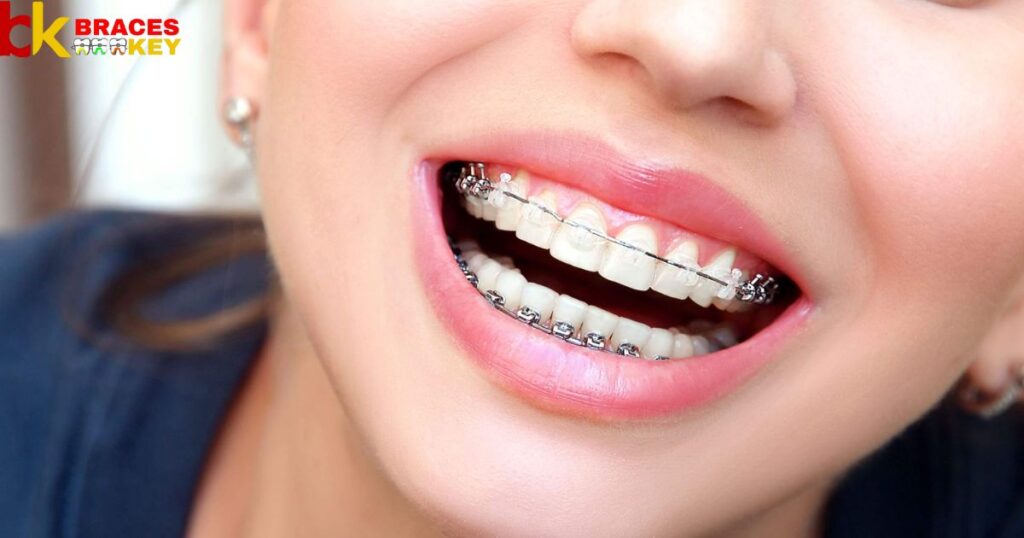
New braces can take some getting used to, and dry mouth is a common side effect as jaws adjust. Symptoms may include thick tongue coatings, cracked lips, dry nasal passages, difficulties swallowing or speaking clearly due to tacky sensations.
While discomforting, these xerostomia signs often disappear within a couple weeks as saliva production regulates to account for brackets and wires. To ease symptoms, orthodontists recommend sipping water frequently and using biotene products designed for dry mouths during treatment.
What Is Xerostomia, And How Is It Related To Dry Mouth With Braces?
Xerostomia, better known as dry mouth, refers to a condition where saliva production is reduced, leaving the mouth feeling parched. For many with new braces, some temporary xerostomia may occur as jaws learn to function with orthodontic appliances in place.
This type of dry mouth is simply due to adjustment and not a long-term issue. By drinking water and using biotene spray, patients can keep symptoms mild knowing their braces don’t actually cause chronic xerostomia, only occasional dryness that swiftly resolves.
Why Is My Mouth Dry With Braces?
Having brackets and wires attached can take some getting used to inside the mouth. This adjustment may initially cause temporary dryness for many brace-wearers as their oral muscles learn to maneuver properly again.
Orthodontic hardware does not directly induce dry mouth, but its new positioning can disrupt regular saliva flow at first. Reassuringly, the xerostomia tends to subside within a couple of weeks as jaws acclimate to their new normal. With hydration and biotene gel, dry spells pass quickly.
Risks Associated With Dry Mouth With Braces
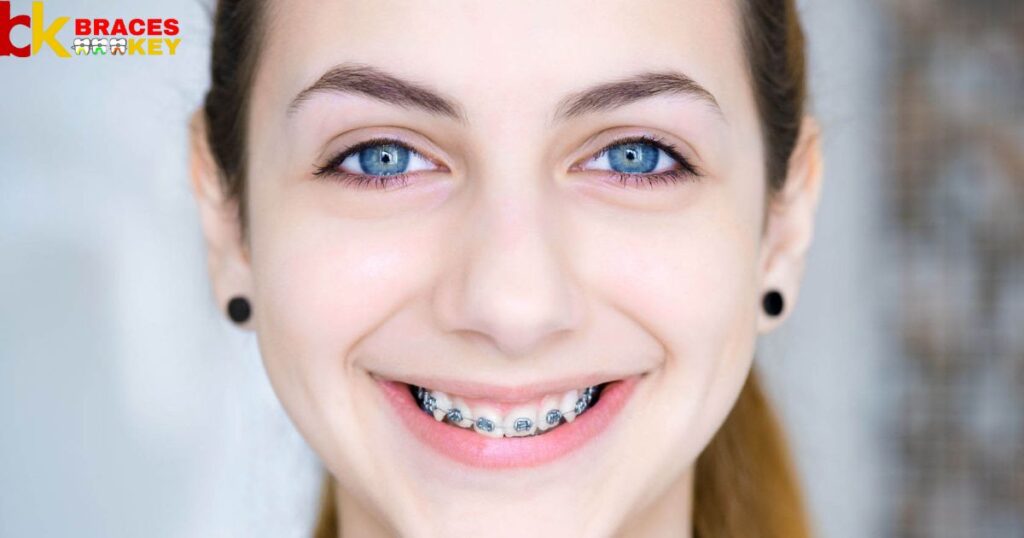
While dry mouth from braces is usually minor and brief, left unmanaged it could lead to issues. Reduced saliva makes the mouth prone to cavities and gum disease as bacteria thrive unchecked. Patients with dryness should take extra care brushing and use fluoride to strengthen enamel during treatment.
Minor discomforts like irritated lips may occur too if dryness persists too long untreated. But risks are easy to avoid so long as proper hydration and moisturizing techniques are followed as directed by orthodontists.
How To Prevent Dry Mouth With Braces?
Managing dryness due to braces is simple through smart habits. Sipping water frequently keeps the mouth moist, as does chewing sugar-free gum to stimulate saliva. Using biotene spray or lozenges designed for dry mouth coats tissues.
Eating crunchy fruits and veggies likewise encourages salivation. Noting any wire or bracket issues to the orthodontist ensures hardware doesn’t hinder fluid flow. Adhering to these tips helps braces wearers sidestep xerostomia entirely during realignment.
What To Do For A Dry Mouth With Braces?
Should dryness strike while wearing braces, a few remedies can easily relieve symptoms. Carrying a water bottle to sip from throughout the day hydrates the mouth. Chewing sugarfree gum or sucking on ice chips stimulates saliva.
For overnight dryness, using a humidifier adds moisture to breathed air. Patients should inform orthodontists about lasting dryness so wax or adjusters can prevent hardware from hindering fluid flow. With simple solutions, brace-wearers can keep their mouths feeling moist.
When To Seek Professional Help?
Most health issues can safely be monitored at home initially. Knowing when to call a doctor is pivotal for proper care. Seek prompt guidance if symptoms are severe, unusual, or progressively worsening over several days.
When in doubt, it’s best to get an expert opinion, especially for conditions that could exacerbate other health problems if ignored long-term. Opting for early medical assistance prevents minor concerns from escalating unnecessarily. Your well-being should always take top priority.
Is Dry Mouth With Braces A Common Problem?
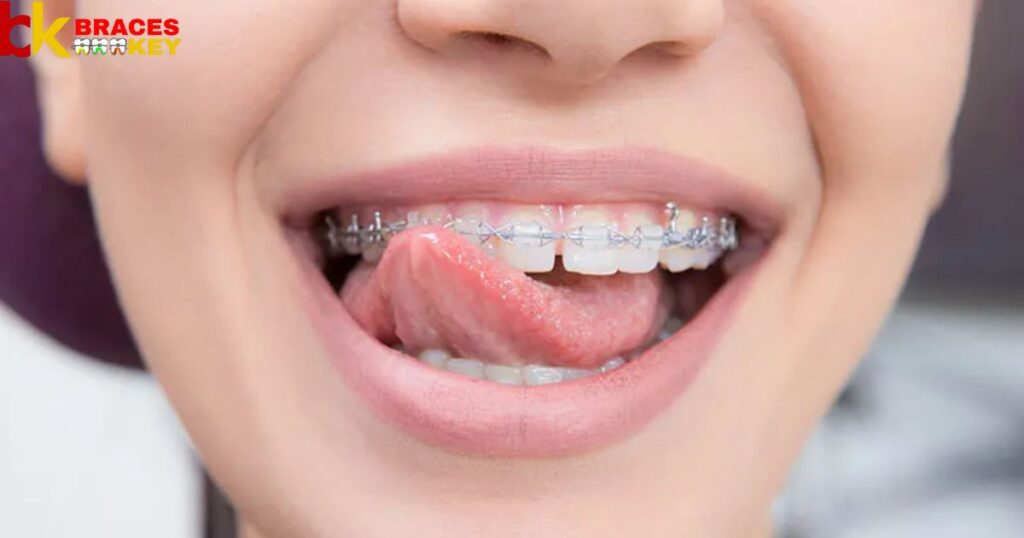
While braces may seem an unusual cause of dryness, reduced saliva levels during orthodontic treatment are quite normal for many patients. Teeth shifting alters jaw positioning, at first mildly disrupting fluid flow.
But dried mouth sensations tend to ease within only a few weeks as salivary glands readjust to mouths modified by aligners and wires. Rarely do permanent issues arise from proper orthodontic care alone. Most importantly, know this common side effect need not last, as saliva regulation soon recovers.
Symptoms Of Dry Mouth With Braces
Newly adjusted jaws mean slight saliva changes are common at first. Signs may be subtle like a vague mouthfeel or more notable like cracked lips. Without intervention, symptoms progress to thickened oral coatings and food getting stuck where wetness is lacking. Also, increased risk of cavities forms without protection where saliva exposure is diminished.
While these indicators may alarm, relief comes as natural balance restores and temporary wetness supports supplements until full hydration resumes. Proper care ensures comfort returns.
Side Effects Of Dry Mouth With Braces
Having braces necessitates an adjustment period for optimal oral health outcomes. Transient dry mouth occasionally arises as jaws recalibrate around new positions. Long-term side effects rarely emerge when dryness remains episodic and mild.
Proper care mitigates contretemps like decay, inflammation or irritation. Minor short-term symptoms may incorporate fuzzy tongue coating or cracked edges but restore comfortably. With temporary remedies and alignment completion, precipitation of serious collateral issues stays circumvented altogether.
How To Keep Your Mouth Moist With Braces?
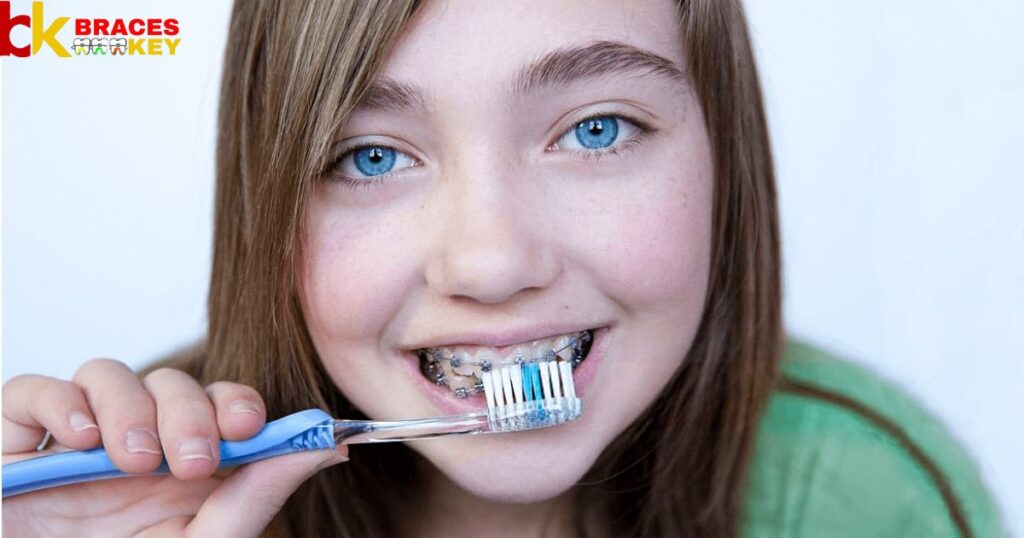
Manageable solutions can offset common oral dryness from orthodontia. Staying hydrated through sipping plain water replenishes fluid losses. Chewing sugarless gum primed with xylitol stimulates salivary flow.
Sprays or lozenges containing glycerin or other humectants provide slippery non-irritating moisture. Even crunchy fruits and veggies encourage fluids during meals while the mouth adjusts. With several gentle options, brace-wearers easily counteract drying out and safely maintain comfort throughout realignment.
Why Does Your Mouth Feel Dry After Braces?
Teeth shifting gradually retrains jaws and lips in a new position, altering dynamics inside the oral cavity. This transition causes minor saliva secretion changes at first through unaccustomed motions.
As muscles regain technique handling rearranged teeth, fluid flow shortly rebounds to normal levels. Temporary dryness arises from the bodily process of adjusting to a new bite structure, not from long-term salivary impacts. With patience and protection during adaptation, the mouth comfortably adjusts once more to feeling moist.
What Happens If Xerostomia Is Left Untreated?
While xerostomia from braces rarely extends beyond a few weeks, neglecting it could spell trouble. Lowered saliva allows plaque to harden unchecked, heightening risk of cavities and gum disease. The mouth struggles to swallow and speak comfortably without proper lubrication.
Over time, persistent dryness may even contribute to infections or difficulty eating certain foods. Fortunately, minor remedies reestablish hydration fast. But seeking care ensures only brief, mild symptoms rather than lengthy oral complications down the line.
10 Solutions For Dry Mouth Caused By Braces Invisalign Or Retainers
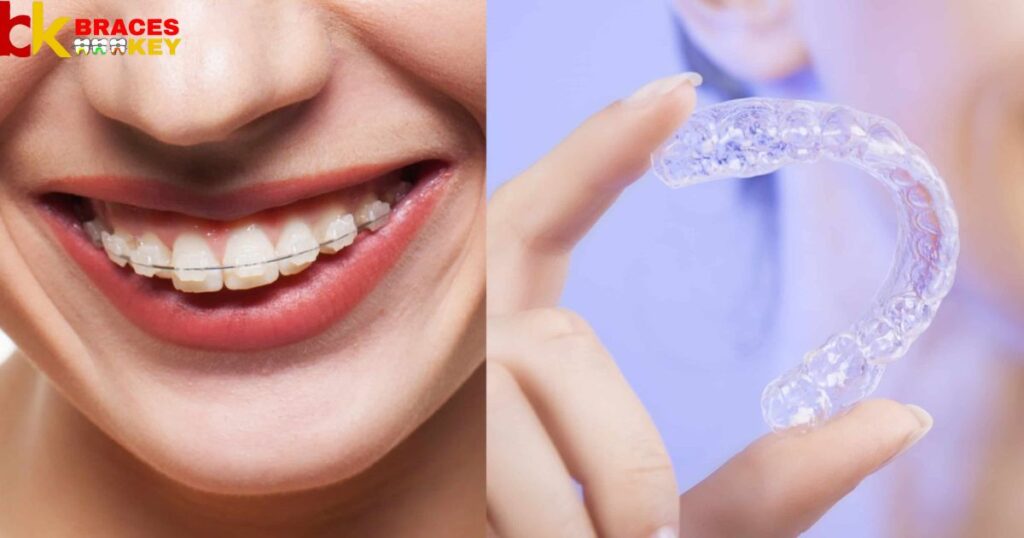
When orthodontia causes temporary dryness, remedies abound to relieve discomfort. Sip water, suck ice chips, or hydrate with sports drinks. Massage salivary glands or use biotene products. Eat crunchy veggies or chew sugarless gum to spur fluids.
Apply wax or moisture retainers where needed. Rinse with baking soda paste daily. Use a warm compress or humidifier at night. Don’t smoke or overuse caffeine/alcohol. Inform orthodontists about dryness for adjustments. Monitor for cavities with fluoride. With options to explore, keeping mouths moist remains manageable.
Tip 1 Stay Hydrated
Tip one – keep sips coming throughout daylight. Carry a water bottle for regular swigs to replenish. Fluids entering support spit production when malaise strikes mid-adjustment period.
Tip 2suck On Ice Chips
Icy pellet snacks provide vivid diversion from dry sensations. As chips dissolve, salivation swells naturally to ease that parchment feel. They offer a simple solution whenever drought strikes unexpectedly. Sucking soothes while secretions spread, a refreshing double remedy.
Tip 3suck On Sugar-Free Mints Or Dry Mouth Lozenges
Tip three involves medicinal mouth melts or mints. Their ingredients actively curb desiccated discomfort during treatment. Compounds activate salivary servicing whilst imparting brisk flavor from the cheekside cavity inward. Disintegration stimulates spit and relief from brass-knuckle tongue and gummy drips.
Tip 4eat Foods With High Moisture Content
Tip four advises replenishment from nature’s bounty. Chronic dryness deserves defeat by crunchy comrades like apples and celery. Such refreshers rouse the tongue with virtue effortlessly. Should thirst strike on the go, compact fruits packed with liquid fulfill a body’s true needs.
Whether banana, berries or local melon, their fluids hydrate holistically with each mouthwatering motion between appointments. Partaking Nature’s rehydrating remedies renders durable dampness from within wherever warmed weather waves wander.
Tip 5 Eliminate Tobacco Products
Cigarette smoke dehydrates dubiously. Its byproducts draw fluid from body’s every cell. Abstaining shortcuts dryness significantly for orthodontic clients. Steer clear completely or switch nicotine sources lest enamel repairs want for wetness beneath wirework’s rule.
Tip 6 Eliminate Alcohol
Alcohol acts similarly to smoldering cinders, zapping dampness inside and out. Sober sips of seltzer are far better when jaws adjust uncomfortably. Hydrate with juice or tea instead to stop thirst in its tracks naturally. Your mouthpiece movements require peak moisture – fargo frivolity’s suck during therapy’s time.
Tip 7 Eliminate Caffeine
Caffeine dehydrates swiftly through its buzz lifts spirits. Forego joe or pop for the duration to sidestep drying effects. While its absence may dampen your morning mood, hydrated happiness awaits with orthodontia’s end in view. Sacrifice momentary pick-me-ups for long-term oral good health and balm.
Tip 8use A Dry Mouth Mouthwash

When thirst strikes despite your best efforts, reach for a specialized rinse. Dry mouth washes use enzymes and salivary stimulants to replenish dampness on demand. Swish a capful before meals or at night, allowing components to indulge parched cracks and crevasses.
Such formulations mimic the tissues’ moisture-making organics from within. A quick wash relieves and reassures all through surface treatments’ dry days. Medicated washes replenish wetness naturally with safe, simple swirls that moisturize all surfaces.
Why Are My Teeth Dry With Braces?
Several factors cause dryness during orthodontic work. Metal brackets impede regular tongue positioning, disrupting cleansing flows. Wires and gum-line hardware disturb passive salivation somewhat.
Flossing friction and bite adjustments temporarily temper fluid levels too. With diligent hydration habits and hygienic help, wetness will return swiftly as movements minimize. Inform clinicians of any chronic dryness concerns too for remedial remedies.
What Should I Do About A Dry Mouth With Braces?
Dryness discomfort demands diverted thinking. Sustained sipping activates abundant available alleviations. Iced temptations excite fluid secreting excellently. Xylitol infused rinses revive regional dampness determinedly.
Vigilant visits to orthodontists verify necessary next steps if symptoms stay saddening. Together troubleshooting treatments target a comfortably saturated situation shortly. Request prescription rinses containing biotene if over-the-counter options offer no relief.
Proper Oral Hygiene Helps To Keep Your Teeth

Precise flossing skims food debris to inhibit decay beneath braces. Toothbrushing thoroughly cleanses all angles and reaches with care. This protects enamel despite wires hindrance to regular cleansing currents.
With brackets blocking regular removal methods, meticulous maintenance proves vital for lively smiling faces. Staying fastidious forestalls future fillings or root problems and keeps orthodontia on track till conclusion.
FAQ’s
Do Braces Make You More Thirsty?
The wirework hinders nature’s self-cleaning and wetting. One feels parched more due to dehydration that braces somewhat bring.
Do Braces Make Your Lips Dryer?
Metal in the mouth interrupts regular lip formation and function. This disruption can indurate the perimeter making it drier than normal.
Can Braces Cause Mouth Problems?
The hardware behind the smile interrupts natural gum defense mechanisms. This interference increases risk for issues like ulcers or infections to form.
Do Braces Affect Saliva?
The brackets and wires alter natural tongue placement and motion. This disruption can influence saliva’s regular production and distribution flow.
Conclusion
While braces are essential for proper alignment, their hardware can unintentionally result in having a dry mouth. Making hydration a priority and maintaining diligent oral hygiene combats this side effect, Dry Mouth With Braces.
Consulting the orthodontist about customizing or replacing any elements exacerbating dryness helps get comfort back on track. With minor adjustments and conscious care, one can safely have a polished smile in progress without constant parched perspiration plaguing the procedure.

